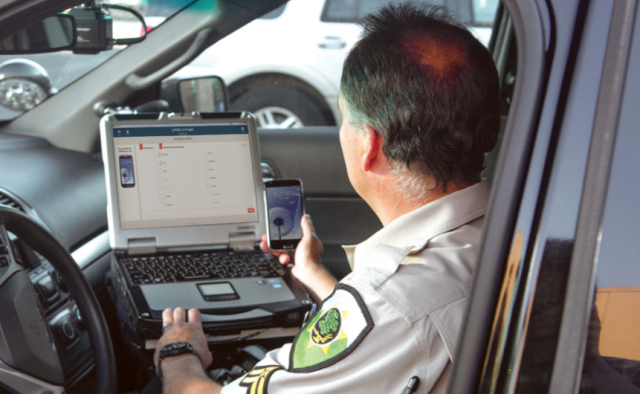There is a very good chance that in the near future, roadside officers will come up to your window and ask for your license, registration, and mobile device. The reason being is that they may soon be outfitted with textalyzer devices, a technology used for determining if a driver was texting while driving.

There are some obvious hurdles in the way of this actually happening, but a few of them might be cleared sooner rather than later.
For one, the technology needs to actually be developed. Well, it’s already underway—an Israel firm called “Cellebrite” is said to already be working on it. (For followers of the news, yes, this is the same company rumored to have helped the FBI break into the iPhone at the heart of the recent decryption argument with Apple.)
Secondly, it needs to be signed into law. Well, that’s already underway too — New York politicians are considering a piece of legislation that would require drivers involved in accidents to submit their phone to roadside testing to determine if they were using their device prior to crashing the vehicle.
Third, it needs to get around the Constitution. Well — you guessed it — that’s been figured out too. To get around the fourth amendment right to privacy, the textalyzer will be specially designed to keep conversations, contacts, numbers, phones, and all data related to specialty apps, private. It will simply tell the officer if the phone was in-use prior to the accident occurring. Further analysis of the phone like, say, to determine if the usage was with hands-free technology and to actually confirm the original finding, might require a warrant (that’s still up for debate).
The proposal for this new law follows some intense lobbying efforts by the group Distracted Operators Risk Casualties (DORC). The son of the group’s co-founder, Ben Lieberman was killed in a 2011 accident by a distracted driver in New York. (This was determined after the Lieberman family subpoenaed the mobile phone records of the driver involved in the crash, which showed the motorist was allegedly distracted while driving.) The law being considered is called “Evan’s Law” in memory of 19-year-old Evan Lieberman.
“When people were held accountable for drunk driving, that's when positive change occurred,” Lieberman is quoted saying in a press release. “It's time to recognize that distracted driving is a similar impairment, and should be dealt with in a similar fashion. This is a way to address people who are causing damage.”
Cellebrite, meanwhile, already has technology in place that can scrape historical content off a phone — what they’re working on now is a way to scale it back a bit.
Worth noting is that if the legislation does pass, Cellebrite would have to formally bid on the project, along with other technology firms.
“Cellebrite has been leading the adoption of field mobile forensics solutions by law enforcement for years, culminating in the formal introduction of our UFED FIELD series product line a year ago,” Jim Grady, Cellebrite's CEO, said in a statement. “We look forward to supporting DORCs and law enforcement–both in New York and nationally to curb distracted driving.”
Getting into some of the finer details of this story: right now, the law is being presented before the New York Senate Transportation Committee. It would basically recast the motor-vehicle driving law to make it so that the motorist gives “implied consent” for “determining whether the operator of a motor vehicle was using a mobile telephone or portable electronic device at or near the time of the accident or collision, which provides the grounds for such testing. No such electronic scan shall include the content or origin of any communication, game conducted, image or electronic data viewed on a mobile telephone or a portable electronic device.”
And if the motorist refuses? Then the police are to inform the diver involved that his / her “license or permit to drive and any non-resident operating privilege shall be immediately suspended and subsequently revoked should the driver refuse to acquiesce to such field test.”
In short, should the driver refuse to submit their phone to the test, his / her license is immediately suspended pending further investigation into the accident.
Per the Centers for Disease Control and Prevention, each day nine people in the US die and more than 1100 people are injured because of distracted driving accidents; this equates to nearly 20% of vehicular mishaps being the result of distracted driving.
“The facts regarding distracted driving are startling,” said Republican New York Senator Terrence Murphy, who is one of the proposal's backers.
Via arstechnica
Advertisement
Learn more about Electronic Products Magazine





